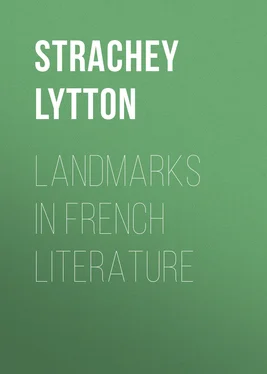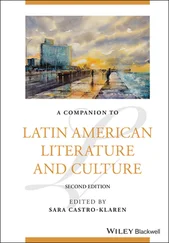Lytton Strachey - Landmarks in French Literature
Здесь есть возможность читать онлайн «Lytton Strachey - Landmarks in French Literature» — ознакомительный отрывок электронной книги совершенно бесплатно, а после прочтения отрывка купить полную версию. В некоторых случаях можно слушать аудио, скачать через торрент в формате fb2 и присутствует краткое содержание. Жанр: Языкознание, foreign_antique, foreign_prose, Зарубежные любовные романы, на английском языке. Описание произведения, (предисловие) а так же отзывы посетителей доступны на портале библиотеки ЛибКат.
- Название:Landmarks in French Literature
- Автор:
- Жанр:
- Год:неизвестен
- ISBN:нет данных
- Рейтинг книги:4 / 5. Голосов: 1
-
Избранное:Добавить в избранное
- Отзывы:
-
Ваша оценка:
- 80
- 1
- 2
- 3
- 4
- 5
Landmarks in French Literature: краткое содержание, описание и аннотация
Предлагаем к чтению аннотацию, описание, краткое содержание или предисловие (зависит от того, что написал сам автор книги «Landmarks in French Literature»). Если вы не нашли необходимую информацию о книге — напишите в комментариях, мы постараемся отыскать её.
Landmarks in French Literature — читать онлайн ознакомительный отрывок
Ниже представлен текст книги, разбитый по страницам. Система сохранения места последней прочитанной страницы, позволяет с удобством читать онлайн бесплатно книгу «Landmarks in French Literature», без необходимости каждый раз заново искать на чём Вы остановились. Поставьте закладку, и сможете в любой момент перейти на страницу, на которой закончили чтение.
Интервал:
Закладка:
The intellectual stirring, which seemed to be fore-shadowed by the second part of the Roman de la Rose , came to nothing. The disasters and confusion of the Hundred Years War left France with very little energy either for art or speculation; the horrors of a civil war followed; and thus the fourteenth and fifteenth centuries are perhaps the emptiest in the annals of her literature. In the fourteenth century one great writer embodied the character of the time. FROISSART has filled his splendid pages with 'the pomp and circumstance of glorious war'. Though he spent many years and a large part of his fortune in the collection of materials for his history of the wars between France and England, it is not as an historian that he is now remembered; it is as a writer of magnificent prose. His Chroniques , devoid of any profundity of insight, any true grasp of the movements of the age, have rarely been paralleled in the brilliance and animation of their descriptions, the vigour of their character-drawing, the flowing picturesqueness of their style. They unroll themselves like some long tapestry, gorgeously inwoven with scenes of adventure and chivalry, with flags and spears and chargers, and the faces of high-born ladies and the mail-clad figures of knights. Admirable in all his descriptions, it is in his battle-pieces that Froissart particularly excels. Then the glow of his hurrying sentences redoubles, and the excitement and the bravery of the combat rush out from his pen in a swift and sparkling stream. One sees the serried ranks and the flashing armour, one hears the clash of weapons and the shouting of the captains: 'Montjoie! Saint Denis! Saint George! Giane!'—one feels the sway and the press and the tumult, one laments with the vanquished, one exults with the victors, and, amid the glittering panoply of 'grand seigneur, conte, baron, chevalier, et escuier', with their high-sounding titles and their gallant prowess, one forgets the reverse side of all this glory—the ravaged fields, the smoking villages, the ruined peasants—the long desolation of France.
The Chronicles of Froissart are history seen through the eyes of a herald; the Memoirs of PHILIPPE DE COMMYNES are history envisaged by a politician and a diplomatist. When Commynes wrote—towards the close of the fifteenth century—the confusion and strife which Froissart had chronicled with such a gusto were things of the past, and France was beginning to emerge as a consolidated and centralized state. Commynes himself, one of the confidential ministers of Louis XI, had played an important part in this development; and his book is the record of the triumphant policy of his crafty and sagacious sovereign. It is a fine piece of history, written with lucidity and firmness, by a man who had spent all his life behind the scenes, and who had never been taken in. The penetration and the subtlety of Commynes make his work interesting chiefly for its psychological studies and for the light that it throws on those principles of cunning statecraft which permeated the politics and diplomacy of the age and were to receive their final exposition in the Prince of Machiavelli. In his calm, judicious, unaffected pages we can trace the first beginnings of that strange movement which was to convert the old Europe of the Middle Ages, with its universal Empire and its universal Church, into the new Europe of independent secular nations—the Europe of to-day.
Commynes thus stands on the brink of the modern world; though his style is that of his own time, his matter belongs to the future: he looks forward into the Renaissance. At the opposite end of the social scale from this rich and powerful diplomatist, VILLON gave utterance in language of poignant beauty to the deepest sentiments of the age that was passing away. A ruffian, a robber, a murderer, haunting the vile places of Paris, flying from justice, condemned, imprisoned, almost executed, and vanishing at last, none knows how or where, this extraordinary genius lives now as a poet and a dreamer—an artist who could clothe in unforgettable verse the intensest feelings of a soul. The bulk of his work is not large. In his Grand Testament —a poem of about 1500 lines, containing a number of interspersed ballades and rondeaus—in his Petit Testament , and in a small number of miscellaneous poems, he has said all that he has to say. The most self-communicative of poets, he has impressed his own personality on every line that he wrote. Into the stiff and complicated forms of the rondeau and rondel, the ballade and double ballade, with their limited rhymes and their enforced repetitions, he has succeeded in breathing not only the spirit of beauty, but the spirit of individuality. He was not a simple character; his melancholy was shot with irony and laughter; sensuality and sentimentality both mingled with his finest imaginations and his profoundest visions; and all these qualities are reflected, shifting and iridescent, in the magic web of his verse. One thought, however, perpetually haunts him; under all his music of laughter or of passion, it is easy to hear one dominating note. It is the thought of mortality. The whining, leering, brooding creature can never for a moment forget that awful Shadow. He sees it in all its aspects—as a subject for mockery, for penitence, for resignation, for despair. He sees it as the melancholy, inevitable end of all that is beautiful, all that is lovely on earth.
Dictes moi où, n'en quel pays
Est Flora, la belle Rommaine;
Archipiada, ne Thaïs—
and so through the rest of the splendid catalogue with its sad, unanswerable refrain—
Mais où sont les neiges d'antan?
Even more persistently, the vision rises before him of the physical terrors of death—the hideousness of its approaches, the loathsomeness of its corruptions; in vain he smiles, in vain he weeps; the grim imagination will not leave him. In the midst of his wildest debauches, he suddenly remembers the horrible features of decaying age; he repents; but there, close before him, he sees the fatal gibbet, and his own body swinging among the crows.
With Villon the medieval literature of France comes at once to a climax and a termination. His potent and melancholy voice vibrates with the accumulated passion and striving and pain of those far-off generations, and sinks mysteriously into silence with the birth of a new and happier world.
CHAPTER II
THE RENAISSANCE
There is something dark and wintry about the atmosphere of the later Middle Ages. The poems of Villon produce the impression of some bleak, desolate landscape of snow-covered roofs and frozen streets, shut in by mists, and with a menacing shiver in the air. It is—
sur la morte saison,
Que les loups se vivent de vent,
Et qu'on se tient en sa maison,
Pour le frimas, près du tison.
Then all at once the grey gloom lifts, and we are among the colours, the sunshine, and the bursting vitality of spring.
The great intellectual and spiritual change which came over western Europe at the beginning of the sixteenth century was the result of a number of converging causes, of which the most important were the diffusion of classical literature consequent upon the break-up of the Byzantine Empire at the hands of the Turks, the brilliant civilization of the Italian city-states, and the establishment, in France, Spain and England, of powerful monarchies whose existence ensured the maintenance of order and internal peace. Thus it happened that the splendid literature of the Ancient World—so rich in beauty and so significant in thought—came into hands worthy of receiving it. Scholars, artists and thinkers seized upon the wondrous heritage and found in it a whole unimagined universe of instruction and delight. At the same time the physical discoveries of explorers and men of science opened out vast fresh regions of speculation and adventure. Men saw with astonishment the old world of their fathers vanishing away, and, within them and without them, the dawning of a new heaven and a new earth. The effect on literature of these combined forces was enormous. In France particularly, under the strong and brilliant government of Francis I, there was an outburst of original and vital writing. This literature, which begins, in effect, what may be called the distinctively modern literature of France, differs in two striking respects from that of the Middle Ages. Both in their attitude towards art and in their attitude towards thought, the great writers of the Renaissance inaugurated a new era in French literature.
Читать дальшеИнтервал:
Закладка:
Похожие книги на «Landmarks in French Literature»
Представляем Вашему вниманию похожие книги на «Landmarks in French Literature» списком для выбора. Мы отобрали схожую по названию и смыслу литературу в надежде предоставить читателям больше вариантов отыскать новые, интересные, ещё непрочитанные произведения.
Обсуждение, отзывы о книге «Landmarks in French Literature» и просто собственные мнения читателей. Оставьте ваши комментарии, напишите, что Вы думаете о произведении, его смысле или главных героях. Укажите что конкретно понравилось, а что нет, и почему Вы так считаете.












